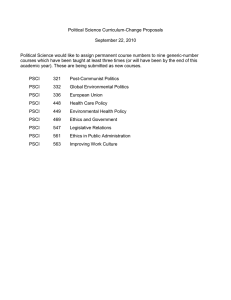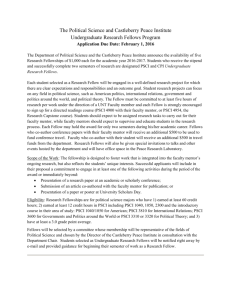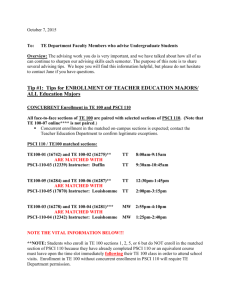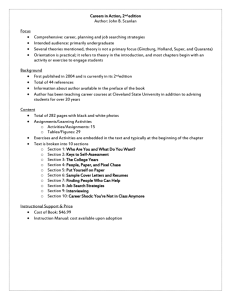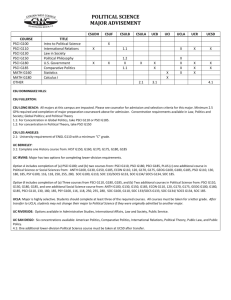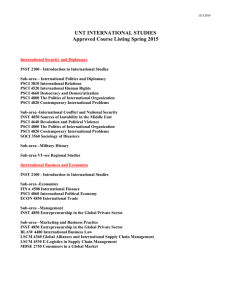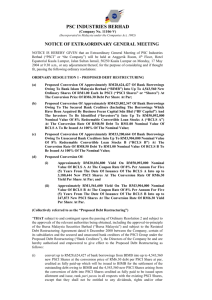Annual Assessment Report
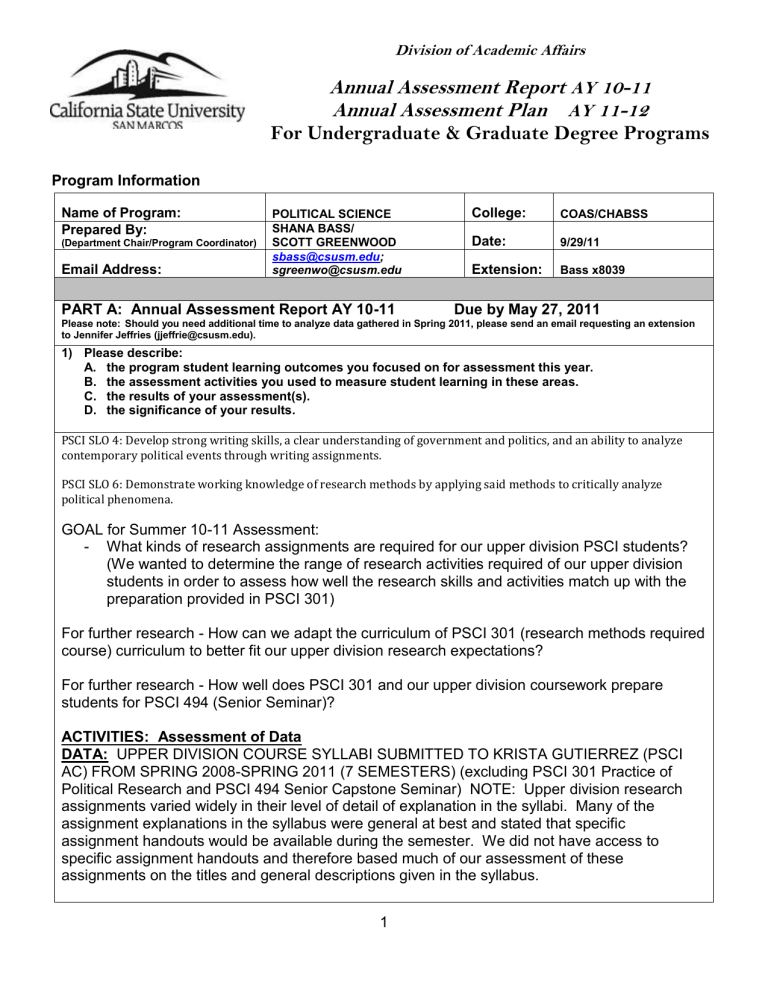
Program Information
Division of Academic Affairs
Annual Assessment Report
AY
10-11
Annual Assessment Plan
AY
11-12
For Undergraduate & Graduate Degree Programs
Name of Program:
Prepared By:
(Department Chair/Program Coordinator)
POLITICAL SCIENCE
SHANA BASS/
SCOTT GREENWOOD sbass@csusm.edu
; sgreenwo@csusm.edu
College:
Date:
COAS/CHABSS
9/29/11
Email Address: Extension: Bass x8039
PART A: Annual Assessment Report AY 10-11 Due by May 27, 2011
Please note: Should you need additional time to analyze data gathered in Spring 2011, please send an email requesting an extension to Jennifer Jeffries (jjeffrie@csusm.edu).
1) Please describe:
A. the program student learning outcomes you focused on for assessment this year.
B. the assessment activities you used to measure student learning in these areas.
Jennfier Jeffiresto
D. the significance of your results.
PSCI SLO 4: Develop strong writing skills, a clear understanding of government and politics, and an ability to analyze contemporary political events through writing assignments.
PSCI SLO 6: Demonstrate working knowledge of research methods by applying said methods to critically analyze political phenomena.
GOAL for Summer 10-11 Assessment:
- What kinds of research assignments are required for our upper division PSCI students?
(We wanted to determine the range of research activities required of our upper division students in order to assess how well the research skills and activities match up with the preparation provided in PSCI 301)
For further research - How can we adapt the curriculum of PSCI 301 (research methods required course) curriculum to better fit our upper division research expectations?
For further research - How well does PSCI 301 and our upper division coursework prepare students for PSCI 494 (Senior Seminar)?
ACTIVITIES: Assessment of Data
DATA: UPPER DIVISION COURSE SYLLABI SUBMITTED TO KRISTA GUTIERREZ (PSCI
AC) FROM SPRING 2008-SPRING 2011 (7 SEMESTERS) (excluding PSCI 301 Practice of
Political Research and PSCI 494 Senior Capstone Seminar) NOTE: Upper division research assignments varied widely in their level of detail of explanation in the syllabi. Many of the assignment explanations in the syllabus were general at best and stated that specific assignment handouts would be available during the semester. We did not have access to specific assignment handouts and therefore based much of our assessment of these assignments on the titles and general descriptions given in the syllabus.
1
QUESTIONS ASKED:
1) SET OF RESEARCH SKILLS REQUIRED?
2) RANGE OF RESEARCH METHODOLOGIES STUDENTS EXPECTED TO USE?
3) TYPES OF RESEARCH ASSIGNMENTS?
4) ADDITIONAL RESEARCH TRAINING?
5) WRITING EXPECTATIONS FOR RESEARCH ASSIGNMENTS?
6) INFORMATION LITERACY EXPECTATIONS FOR RESEARCH ASSIGNMENTS?
RESULTS:
We taught 36 different upper division courses (including 3 core courses)
1) SET OF RESEARCH SKILLS: Article, Book, and Reviews (at least 17 courses); Literature
Reviews (at least 3 courses); Thesis Statements/Arguments (at least 7 courses); Research
Design/Proposals (at least 3 courses); Data Analysis (at least 5 courses); General Research
Skills (at least 30 courses)
2) SET OF RESEARCH METHODOLOGIES: Case Studies; Comparative Case Studies;
Document/Content Analysis; Data Analysis
3) TYPES OF RESEARCH ASSIGNMENTS: Article, Book, Film Reviews/Reading Analysis;
Country Studies; Election Studies; Thought Papers; Exploratory Papers; Compare/Contrast
Papers; Case Studies; Dataset Analysis; Policy Analysis; Policy Plans; Research Designs;
Literature Reviews; General Research Papers; General Research Presentations.
4) ADDITIONAL RESEARCH TRAINING IN UPPER DIVISION COURSES: Library Workshops;
Links to Resources on specific types of papers; In-class training
5) WRITING EXPECTATIONS FOR RESEARCH ASSIGNMENTS: We expect our students to write a lot, and often. Over 90% of our classes require at least one writing assignment aside from examinations. Approximately 40% of our classes require at least 2 different writing assignments. Student research papers range from 5-15 pages in length, with shorter assignments ranging from 1-5 pages, with at least 18 classes requiring multiple submissions of shorter assignments (e.g. 3 Article Reviews, 2 Thought Papers). (Essay examinations were not included in this dataset)
6) INFORMATION LITERACY EXPECTATIONS FOR RESEARCH ASSIGNMENTS: Identification and Analysis of appropriate Primary Sources; Identification, Analysis, Critique, and Synthesis of Scholarly Articles and Books in the field, Analysis and Critique of Documentary and other
Films; Identification and Analysis of appropriate Datasets (including legislation, election data, census data, various types of comparative country data, etc.)
ANALYSIS:
1) We expect our students to write a lot in many different types of assignments.
2) We expect our students to be able to use basic research skills.
3) We expect our students to immerse themselves in our field’s scholarly work.
4) We expect our students to be able to find and analyze primary sources
5) We provide our students additional, course assignment-specific research training in our upper division classes to refresh and supplement the research skills learned in PSCI 301.
6) We have significant Information Literacy expectations of our students.
SIGNIFICANCE:.
1) The Political Science Department engages students in a variety of research activities that are appropriate for upper division and the course content. Political Science Faculty can learn from each other’s unique approaches by periodically sharing ideas for assignments.
2) PSCI 301, along with our upper division courses, together provide opportunities for students
2
to learn and exercise various course-appropriate research skills in preparation for the Senior
Seminar.
2) As a result of your assessment findings, what changes at either the course- or program-level are being made and/or proposed in order to improve student learning? Please articulate how your assessment findings suggest the need for any proposed changes.
Our assessment findings indicate that we expect a range of research skills, writing, and information literacy from our upper division students. Further, our findings indicate that we could clarify and solidify the connections within our curriculum – between our CORE courses, upper division courses, and our Senior Seminar.
The PSCI Department could consider the following: a.
Formal Assessment of a set of completed Upper Division Research Assignments to more clearly determine research expectations, as well as student learning. b.
Consider how to revise the curriculum of PSCI 301 in light of the Upper Division
Research Expectations found in this assessment, any specific assessment of completed assignments that may occur, as well as the specific set of PSCI 494 Senior Seminar explicit expectations. c.
PSCI Faculty could consider how to further focus upper division course assignments toward the goal of preparing students to fulfill the explicit expectations of PSCI 494
Senior Seminar. d.
The PSCI Department could consider creating a writing and research “resource center” on our Department Website, providing lists of and links to discipline specific and appropriate writing and research resources for all students in one central location to provide guidance, continuity, and to reflect our department’s priorities and e.
expectations.
In light of our considerable information literacy expectations, we may consider adding an Information Literacy SLO to our set of PSCI Department SLOs.
3) If you used the resources that were given to you as stated in your plan, please check here.
If you used them differently, please provide specifics.
PART B: Planning for Assessment in 2011-2012 Required by O ctober 3, 2011
1) Describe the proposed PSLO activities for AY 2011-12. (Note that assessing PSLOs can take many forms.
Programs may find the attached list of sample assessment activities helpful.
Please check the Assessment website for additional resources at www.csusm.edu/assessment/resources/ ).
3
2) What specific assessment activities will you conduct this year in order to measure student achievement of these outcomes?
3) Please describe how the assessment support of $750 will be used.
Sample of assessment activities:
Development (or review and refinement) of measurable program student learning outcomes.
Development of program student learning outcome matrix, showing in what courses each
PSLO is assessed, or each PSLO is introduced, reinforced and expected to be mastered.
4
Identification and assessment of one or two program SLOs.
Development of rubrics for assessing PSLOs.
Development of commonly agreed upon “signature assignments” designed to assess mastery of PSLOs.
Faculty assessment retreat.
Dissemination and/or discussion of PSLOs with students in the program.
Development of course learning outcomes and delineation of their relationship to PSLOs.
5
